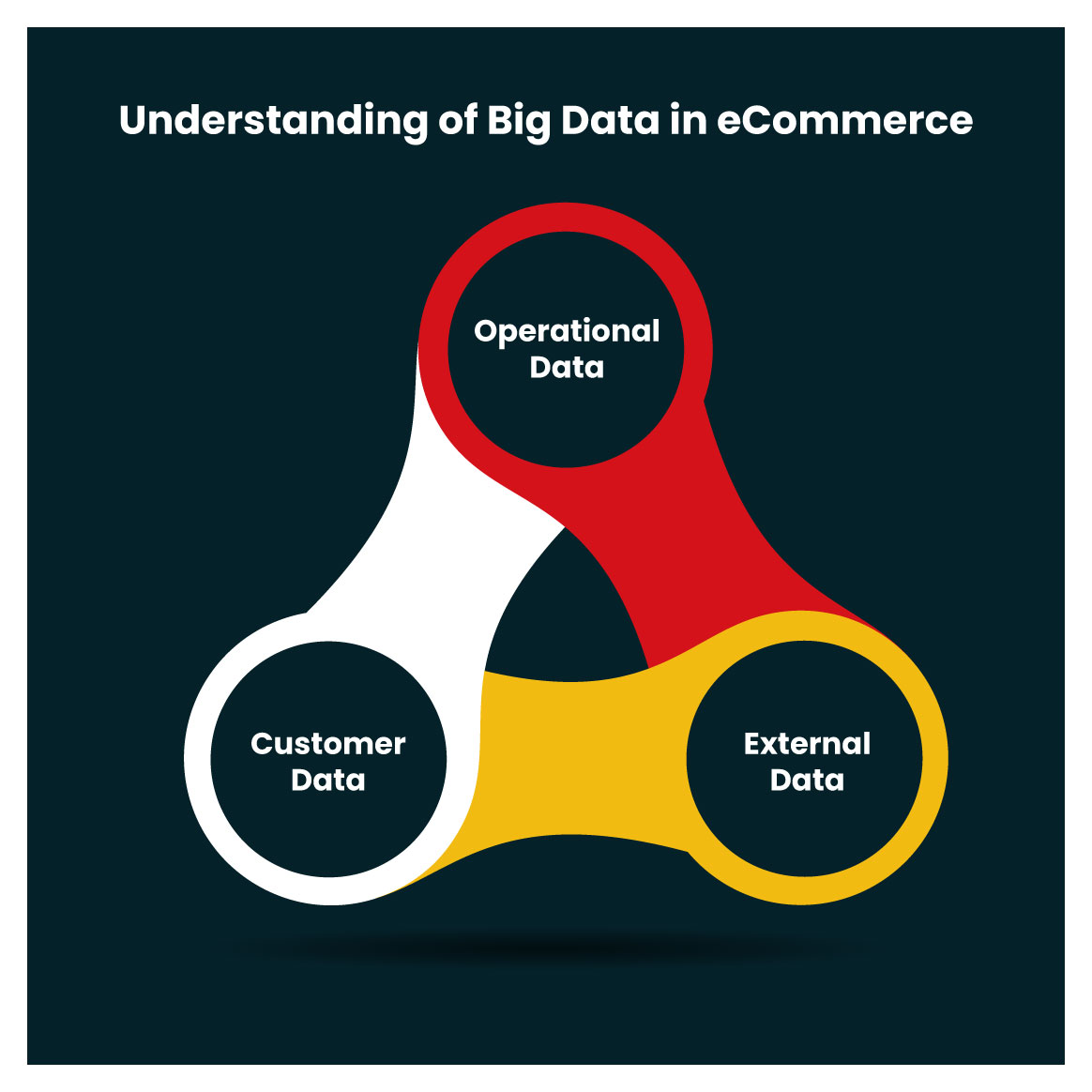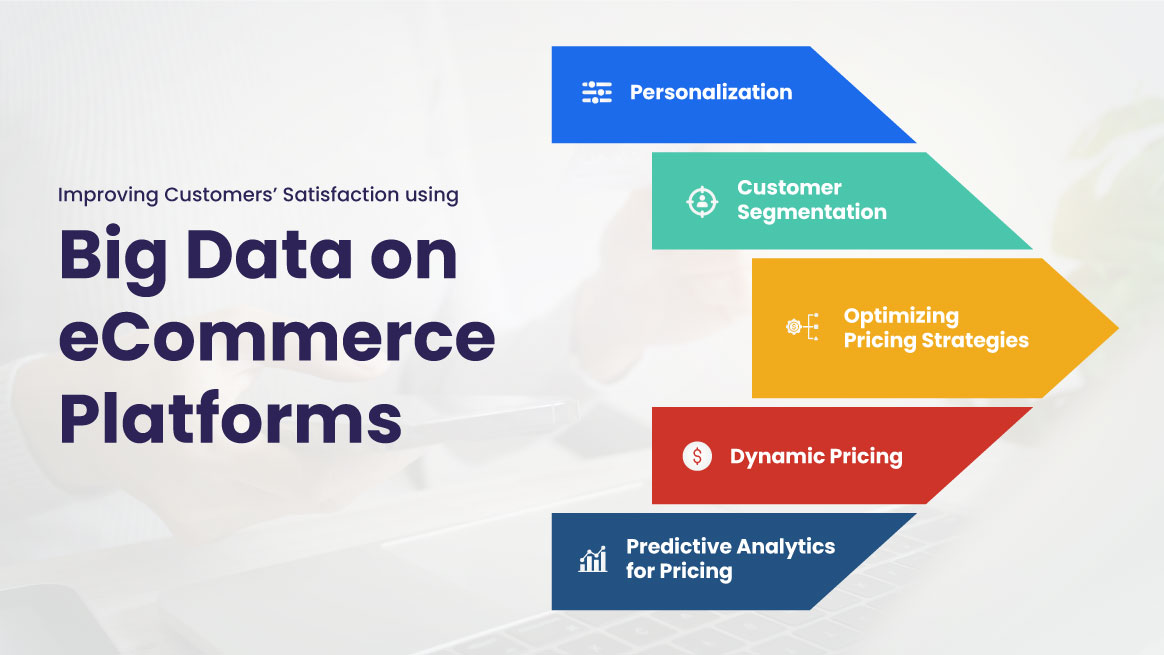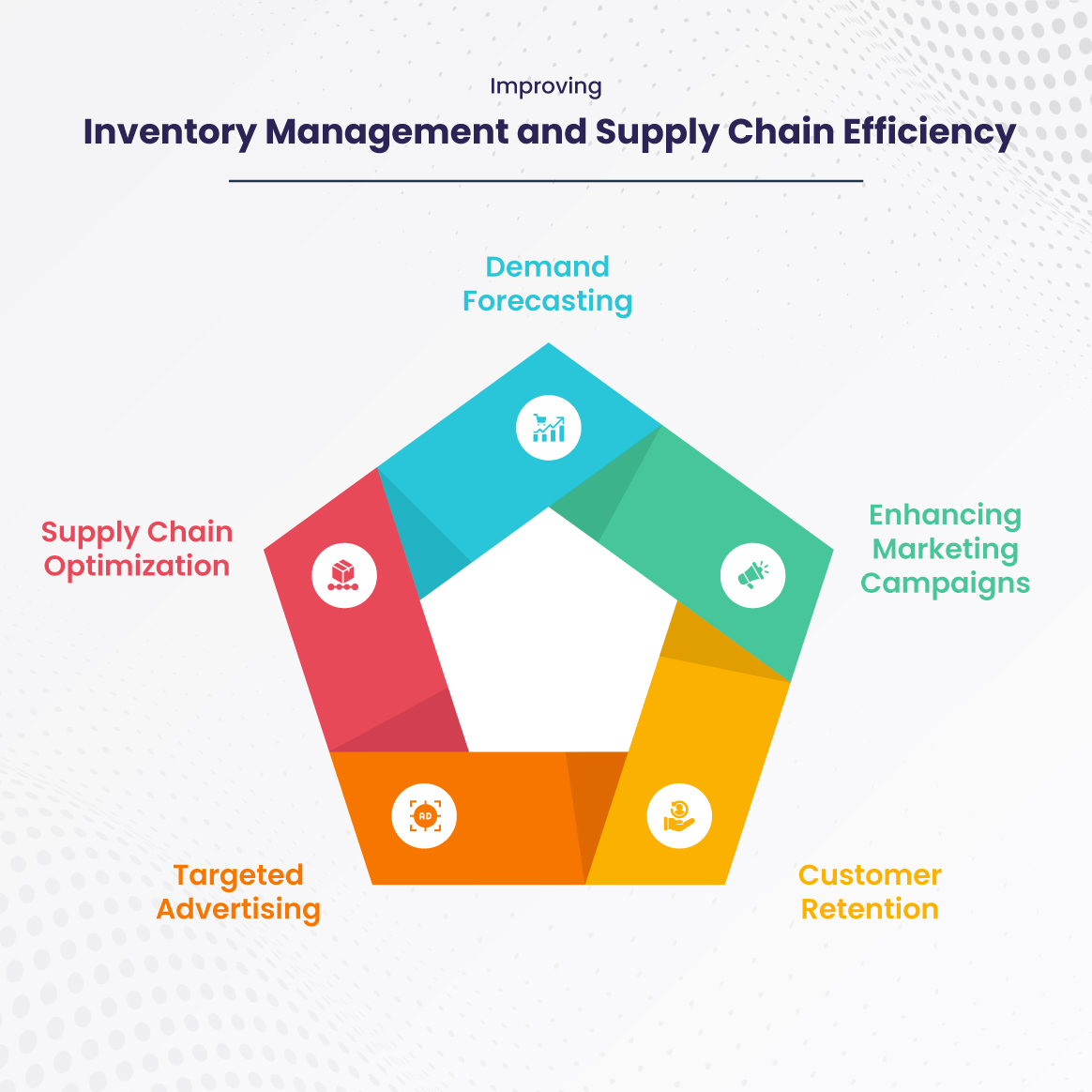The business landscape has transformed over the years, with data-driven decisions becoming the need of the hour. There is no doubt that digital transformation services are reforming businesses drastically. Big Data is becoming a big deal today. And the fact that data is available in massive volumes today makes it even more powerful and challenging at the same time.
Much of that data can be disclosed about the customers, products, competitors, markets, and the industry. Big Data Analytics is being embraced widely to get actionable insights that drive growth-generating decisions for businesses.
Businesses across all domains have started recognizing Big Data as a technology that opens new frontiers for them and eCommerce is no exception. There have been considerable changes in the eCommerce environment in the last decade, because of the improvements in technology as well as the growth in customers’ sophistication. As such, there has been the emergence of the need to access the capability of using data to gain a competitive advantage in the fast-paced environment.
The significance of big data analytics services solutions as the source of great potential is that big data helps the eCommerce business to increase its growth rate, improve customer experience, streamline all processes, and become leaders in the markets.
Understanding of Big Data in eCommerce
First, let us discuss what big data implies regarding eCommerce. Big data, also known as ‘large data’, can be described as structured and unstructured data that consumers, operations, and external sources generate. The information in such databases is not trivial; it is crucial and helpful if analyzed correctly for making decisions and enhancing business development.
In eCommerce, emerging tech solutions like big data can be broadly categorized into three types:
Customer Data
These advanced visitor data included data like the visitor’s or customer’s buying records, site browsing history, social media chat history, and on-site remarks. This data offers a broad and valuable insight into the customers’ choices and buying habits.
Operational Data
This means information concerning inventories, supply chain measures, and transaction records. They benefit a business organization in that they contribute to defined and efficient operations.
External Data
This information is external, meaning that it is gathered from sources external to the organization in question and may include; market data, competitor intelligence, and the general macro-economic environment. It helps to assess the general market context and impacts and to make tactical decisions.
Improving Customers’ Satisfaction using Big Data on eCommerce Platforms
Perhaps the most critical opportunity that can be derived from big data in eCommerce is how the actual customer experience can be altered. In a highly saturated environment often customer service and experience during the purchase is the ultimate edge in the competition.
Personalization
Big data predictive analytics services specifies marketing applications targeted product suggestions to customers, as well as custom marketing messages. Hence, the collection of customer information allows eCommerce platforms to make predictions and satisfy the customer’s needs on a more personal level.
For example, the recommendation engine in Amazon is a perfect example of big data, providing customer suggestions based on customer browsing and purchase history. Such detailed individualization also has several advantages, including the improvement of the shopping process, as well as the higher rate of purchasing and customer retention.
Customer Segmentation
Besides individual customization, big data extends customer categorization to a higher level. When the customers are segmented based on how they act, what they are, and what they like, then the business can promote certain products to these unique segments.
The advantage of this targeted marketing approach is that the marketing dollar is channeled where it has a greater chance of getting the attention of the target audience and thus generates better customer response rates.
Optimizing Pricing Strategies
Pricing is a very essential aspect of the eCommerce businesses. Through big data, companies can develop and use new and changing pricing schemes that will help increase their revenues.
Dynamic Pricing
Dynamic pricing means that the price of the product changes with the change in the demand or supply of the product or due to competition from rival firms. Big data has made it possible for eCommerce businesses to monitor these factors in real-time and make price adjustments in consideration of the conditions.
During certain peak seasons, the price can be hiked while in other humble seasons, new promotions and sales can be created to instigate demand. Pricing flexibility can thus have a big impact on the degree of profitability.
Predictive Analytics for Pricing
This is achieved through predictive analytics that is fueled by big data takes pricing optimization a notch higher. Through historical analysis of future indicators and evaluating market trends potential customers can be determined and prices fixed.
This approach helps to come up with not only defensive but also an assertive strategy on pricing strategies, which will benefit businesses once they are in the market and not end up making some losses.
Improving Inventory Management and Supply Chain Efficiency
The management of stock and supply chain is very important to businesses, especially eCommerce businesses. These areas are critical in the outcomes attained in terms of costs and consumer satisfaction where big data is central.
Demand Forecasting
Demand forecasting is possible by analyzing historical sales data, customers’ buying trends, seasonality, and even the economic conditions embraced in the big data. Using such points, organizations can determine the right stocks to secure and at what times they are required. This helps to avoid cases of overstock or stock out which are expensive when managing a business and may lead to customer dissatisfaction.
Supply Chain Optimization
Aside from demand forecasting, the valuable input of big data is that it can enhance the whole supply chain process. This allows businesses to analyze supplier and logistics providers’ data and customers to realize areas of weakness that require improvement.
Walmart has applied big data to optimize its supply chain for delivering products while cutting its expenses. The level of optimization goes not only to the improvement of the company’s profitability but also to the customers’ satisfaction resulting from the proper delivery of goods.
Enhancing Marketing Campaigns
Marketing is one of the most important aspects of any successful business, and data has changed how organizations work on their marketing initiatives.
Targeted Advertising
Big data makes it possible to develop precise advertising messages that will be delivered right to the right users at the right time. Customer data is valuable in segmenting the customers, and the business can establish which channels and messages are most effective for each segment.
Such accuracy helps to avoid wastage of marketing budgets and therefore improves the conversion rates and thus the overall return on investment. For instance, through its client’s advertising interface, Facebook uses big data analytics to provide some of the most relevant ad placements to clients that deal in eCommerce, to target their ideal clients.
Customer Retention
Customer retention also hugely utilizes big data analytics to determine the best approaches to take. When there are such customers who are potential churners or potential loyal customers with reduced patronage, businesses can curve a practice on how to woo them back.
Again, in customer maintenance, big data can go a long way in ensuring customer loyalty through loyalty programs, personalized offers and follow-ups.
Turning the Big Data into Business Intelligence
In addition to simple organizational efficiencies, big data is a source of decision support that is a useful input for strategizing.
Customer Insights
Big data gives information about customer needs, preferences, purchasing behaviors, and their latent requirements. Through this data, business people can be in a position to foresee customer needs as well as change their products to suit the customers’ needs.
For example, big data is used by Netflix, for the identification of the interests of the viewers, thus, Netflix can create programs that would be popular among its viewers.
Market trends and competition features
It also helps businesses detect market trends, hence putting a business in a strategic position of having an edge over its competitors. From the observation of the outer environment, such as social networks, market research, and activities of competitors, companies can define trends and adapt in this sense. This makes them prepared for any change in the market so that they do not lag in the business world.
Challenges and Considerations
That, however, is not to say that big data is without its drawback; the following are some of the issues businesses must contend with to optimize the use of big data assets.
Data Privacy and Security
As the saying goes, with a large amount of data comes the responsibility to manage it properly. Another issue companies must address is the privacy of the customers’ information and the legislation concerning it, e.g., GDPR. If this is not done appropriately, then there are likely to be some severe consequences and bad impacts on the brand.
Data Quality and Management
Big data’s relevance hinges on its ability to be precise and, therefore, useful. This suggests that businesses need to put in place sound data management mechanisms to obtain good, reliable, and current data.
Scalability
This is because as the eCommerce businesses expand so does the amount of information that is produced. When dealing with data, there must be highly available data assets that operate under a property of scalability in which they can manage increasing volumes of data flow without threatening performance.
How eCommerce Can Leverage Big Data as A Growth Engine
Know your customer better
The first step to selling successfully is to build a buyer persona because you will need to understand who your customers are and what they expect from your products and services. With Big Data Analytics Solutions in place, merchants can get a genuine picture of customer behavior through an accurate analysis of their browsing behavior and shopping patterns.
- It becomes easy to comprehend their inclination towards specific products, categories, and brands by tracking their touch points and the website areas they access repeatedly and spend maximum time on.
- You can get to know where you need to improve by identifying gaps and trends toward cart abandonment.
Deliver better shopping experiences
Without any doubt, knowing your customer better empowers you to deliver better shopping experiences. A Big Data Analytics tool enables to gathering and analysis of voluminous data from disparate sources including website analytics, social media data, email marketing, and more for a comprehensive analysis.
- Knowing what works and what does not across all the points of customer interaction gets you on top when it comes to polishing the shopping experiences for your buyers.
- The best way would be to tweak your processes, products, and content to align with the buyer’s expectations.
Improve the level of customer service
Another way in which Big Data Analytics can enhance eCommerce businesses is by helping them improve customer service. In the first place, it is crucial to understand the significance of customer service for boosting your sales.
- Even if you invest all your best efforts in eCommerce web development and come up with an impressive product catalog.
- You will be unable to achieve your targets unless you deliver excellent customer service.
- Data analysis gives you knowledge about the gaps in your product quality and service delivery; so, you know how you can serve the shoppers to an extent that they have no complaints and come back for more.
Predictive analysis for better planning
Beyond just getting you closer to the customers and streamlining the sales function, data analytics can do much more. These offer rich insights that provide a greater depth in the understanding and alignment of the entire operations.
- Predictive analysis can be leveraged to plan and manage operations such as inventory and supply chain.
- You can gather a fair idea about the future trends in demand and create sales and pricing strategies to maximize profits.
Ease and security of online payments
Online payments are a key aspect of selling through eCommerce. While you must offer diverse payment options for the shoppers, there should also be the assurance that their transactions and financial details are secure through the process.
- By analyzing the payment data, the store can understand the behavior of the users to find out the most popular payment methods that they must integrate into their eCommerce store to maximize sales.
- Further, these insights also help them to distinguish genuine users from fraudsters, which can be of key importance for preventing online fraud and building trust for the store.
Concluding Thoughts
Considering these amazing benefits, it does not come as a surprise that Big Data is fast becoming one of the most significant eCommerce website development trends today. Unless you are willing and able to adopt a solution that leverages the immense potential of data, you cannot expect your business to grow and achieve your targets. The best thing about this technology is its comprehensiveness; from enabling better customer satisfaction to preventing fraud, and empowering better decision-making, there is much that it can do.
- Adoption of this technology requires you to collaborate with a team that comprises expert eCommerce website developers and Big Data specialists.
- At OrangeMantra, we are a leading technology partner that caters to both these services at one destination.
- Over the years, we have developed numerous online stores for startups and enterprises.
- With a team that excels in the latest technologies, we come ahead as a name that you can trust for integrating Big Data Analytics into your online store.
FAQs
How can small eCommerce businesses effectively leverage big data without a large budget?
New eCommerce small businesses can use basic tools that are cheap or come with free trials where they monitor the customer conduct and the sales. They can also concentrate on the valuable metrics that doing so gives them, like customer segmentation, launching of targeted marketing strategies, and providing personalized customer experience. Another advantage of utilizing big data is partnering with third-party platforms that provide big data services suitable for SMBs.
What are the main challenges eCommerce companies face when implementing big data strategies?
This is why primary issues present great difficulties; here they are data security and confidentiality, quality and accuracy of large data quantity, and adequate infrastructure. Finally, companies may experience challenges as the platform integrates big data into original activities and problems related to the definition of qualified personnel in the sphere of big data analysis.
Can big data help eCommerce businesses with customer retention, and if so, how?
Yes, big data will help in improving the rate of customer retention for organizations because the problems such as identification of customers who are almost showing the signals that they are willing to leave, formulation of specific strategies to reach out to these customers, and in the proper management of loyalty programs.
Through usage of information from the buying process, searching and choosing behavior, and customers’ feedback, company needs will be forecasted, customers will be rewarded in time, and loyalty will be encouraged.


























